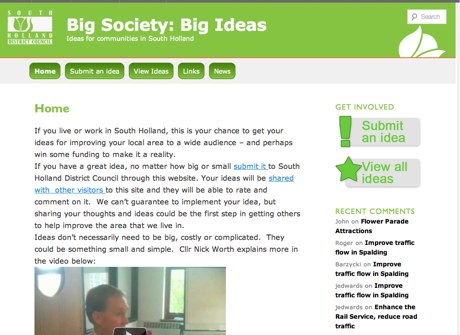David Wilcox does his usual excellent summarising and commenting job on the latest snafu involving BIG Lottery funding and the internet.
It’s all about a grant of £1.89 million to the Media Trust, to fund the establishment of “connected news hubs around the UK to support citizen journalism and to help communities and charities get their voices heard”.
Hmmmm. I’ve said many a time before that the future of journalism debate is one of the most boring in the world – certainly one of the least relevant to actual people with proper lives with real things to worry about.
So the use of the word journalism in this project concerns me – it brings to the table assumptions and values which I’m not sure belong in this context.
This follows a grant of £830k under the People Powered Change programme to Your Square Mile to develop a network of local community websites. It’s described as a “digital one stop shop” – excellent!
Excuse my sneering, but 1999 is calling and it wants its slogans back.
David writes in his analysis:
The issue is perhaps not so much why the Media Trust got the funding, but why Big Lottery didn’t spend some time exploring the difference between citizen journalism, community reporting, and hyperlocal media. Or if they did, could we please see the report? That would be transparency.
One thing that is becoming clear is that communities come before websites. That is to say, the motivation for starting a community web project must come from the community first and not a solution being imposed from elsewhere. It’s been tried countless times and doesn’t work.
The experts in the field, such as the Talk About Local guys totally get this, which is why their nationally-focused solution takes the lead from local need, and is platform neutral. No one size fits all model there, and rightly so.
It’s also why social media surgeries work so well. Nobody there has a service to push – the ‘surgeons’ listen to people’s problems, or what they want to achieve, and they advise on the quickest, cheapest solution.
There is often an assumption that a centre of power must always fill a vacuum. In this case, there is no doubt that local communities organising themselves online can benefit both those communities and the local council, if it chooses to listen.
That doesn’t mean however, that the council should be the provider or indeed the instigator of the websites. Far better to bring in a third party, who understands this stuff and who will advise the different communities what the best solution is for them – not develop a single platform and assume it will work for everyone.
Likewise with these big national programmes. What if the Your Square Mile product isn’t what communities want? What if the MediaTrust’s understanding of a ‘connected news hub’ (actually, does anyone have an understanding of what one of those is?) doesn’t match anyone else’s?
The point of localism is that different communities have different needs, which means they need different tools and solutions. Yet still ‘scalable’ single solutions get funded. But of course you can’t scale bespoke, even though bespoke is what is needed here.


